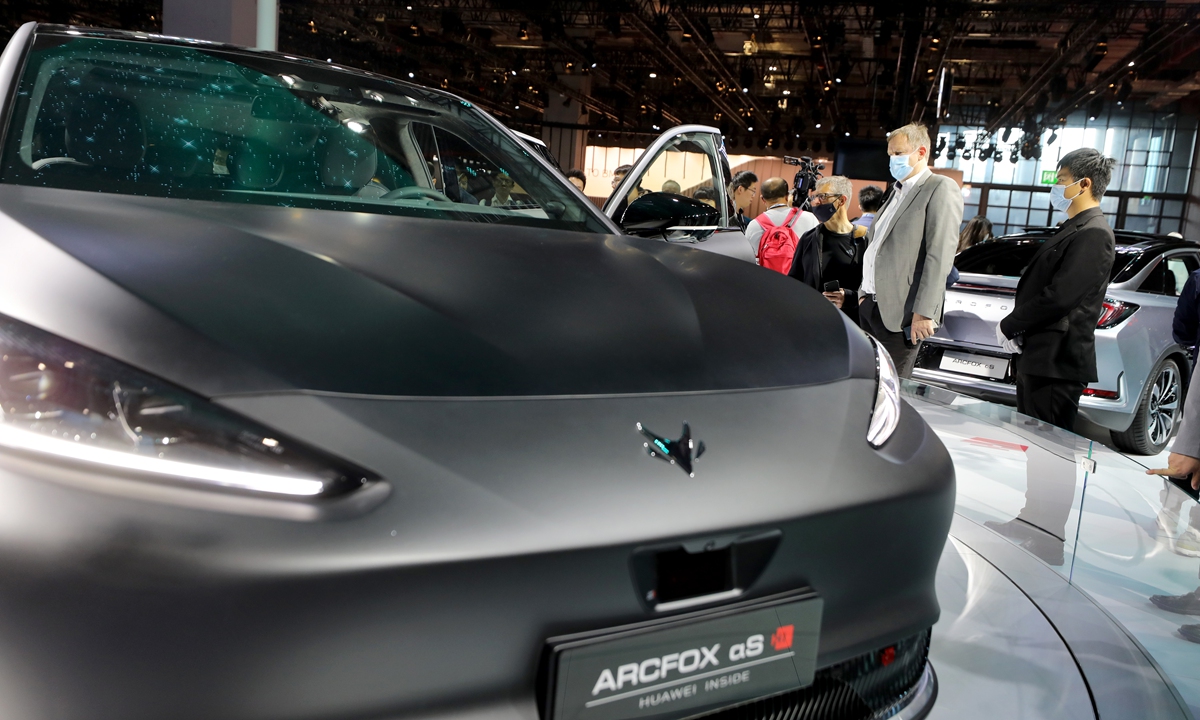Huawei's Q1 earnings show initial results of forced change, but uphill battle lies ahead
Embattled firm survives US crackdown, but still faces uphill battle

Huawei unveils ARCFOX Alpha S in cooperation with BAIC Motor Corp at Shanghai auto show. Photo: Yanghui/GT
Chinese technology company Huawei reported a plunge in revenue but a jump in profits in the first quarter, as the company copes with a faltering smartphone segment under the US blockade and while also enjoying robust growth in businesses that target enterprise clients.
The results showed that the embattled company has managed to survive the malicious US crackdown, while maintaining its cash flow; however, it still faces an uphill battle ahead before bottoming out and emerging from its darkest moments, analysts said.
First-quarter revenue fell 16.5 percent year-on-year to 152 billion yuan ($23.44 billion), the company announced on Wednesday. It was the second consecutive quarterly revenue contraction for Huawei. In the fourth quarter of 2020, revenue declined 11 percent year-on-year.
Its profits grew 26.6 percent to 16.9 billion yuan, according to the Global Times' calculations, based on the first-quarter financial report Huawei Investment & Holding Co sent to the Shanghai Clearing House on Wednesday.
The net profit margin reached 11.1 percent, up 3.8 percentage points year-on-year, the company said, attributing the growth partly to a patent royalty income of US$600 million.
The report didn't break down earnings according to specific business divisions.
"2021 will be another challenging year for us, but it's also the year that our future development strategy will begin to take shape," Eric Xu Zhijun, Huawei's rotating chairman, said in a press release on Wednesday.
As the Biden administration shows no sign of relaxing the chip ban, Huawei needs to solve the bottleneck issue of ensuring chip supply this year. It is not clear how its new businesses will make up for the drop in its consumer business, analysts said, with some anticipating a 20-percent reduction in revenue in 2021.
Ma Jihua, a senior tech industry analyst based in Beijing, told the Global Times on Wednesday that the revenue decline was "within expectations" and was mostly due to Huawei's sliding smartphone business, which generally accounted for about half of its total revenue.
According to a report by Strategy Analytics, Huawei didn't make it into the top five global smartphone shipments in the first quarter. Last year, it was No.3 in global shipments.
Also in November last year, Huawei sold budget smartphone brand Honor to keep it free from US export restrictions, which the company said also led to its revenue slide in the consumer business.
Huawei was put onto a US chip export blacklist in May 2019, with the malicious aim to cripple China's technology rise. The company rushed to stockpile chips and components in the first half of 2020, ahead of the trade restriction.
"Huawei spent a lot to build up its stockpiles last year. This category of spending declined in the first quarter, and that's partly why profits rose," Ma explained. The profit jump also indicated that its business-to-business divisions - such as those providing services for telecom carriers - maintained high growth, he said.
Ma predicted that Huawei's waning smartphone business will drag down its revenue by another 20 percent this year, while its diversification strategy, if successful, will provide for single-digit profit growth, similar to last year.
Analysts said the first-quarter results showed that Huawei's forced strategic adjustment from a hardware provider to a software supplier has shown initial success, and the company's businesses mostly operated as usual despite the US crackdown.
Jiang Junmu, an industry analyst and a close follower of Huawei, told the Global Times on Wednesday that Huawei's semiconductor inventory this year will be enough to supply its business-to-business divisions, but its reduced smartphone chips stockpiles will continue to wreak havoc on its consumer business.
Earlier this month, Xu said at an industry conference that the telecom equipment giant has no illusions about the Biden administration removing it from the US Entity List.
Xu said in the press release on Wednesday that the company will remain committed to investing in investing heavily in R&D and addressing supply continuity challenges caused by restrictions in the market, while emphasizing certain business segments such as 5G and software.
In mid-April, Huawei started to sell smart vehicles in its flagship stores across China, as part of an effort to generate new revenue. It's also looking to scale up investment in other business lines, such as cloud services and providing technologies for mines, ports and the photovoltaic industry.
In 2020, Huawei's revenue stood at 891.4 billion yuan, up 3.8 percent year-on-year, while net profits rose 3.2 percent to 64.6 billion yuan.



